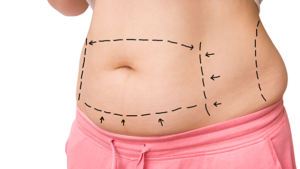 Abdominoplasty, known more commonly as a tummy tuck, is a surgical procedure done by a plastic surgeon to remove excess skin and fat from the middle and lower abdomen. This form of cosmetic surgery is popular for those desiring a smaller and flatter belly and is extremely popular after pregnancy or massive weight loss. However, a tummy tuck is not a solution for weight loss or exercise. By tightening your muscles and narrowing your waist, this procedure can dramatically reduce the appearance of a protruding abdomen. Most patients report that their self-esteem is higher after a tummy tuck procedure.
Abdominoplasty, known more commonly as a tummy tuck, is a surgical procedure done by a plastic surgeon to remove excess skin and fat from the middle and lower abdomen. This form of cosmetic surgery is popular for those desiring a smaller and flatter belly and is extremely popular after pregnancy or massive weight loss. However, a tummy tuck is not a solution for weight loss or exercise. By tightening your muscles and narrowing your waist, this procedure can dramatically reduce the appearance of a protruding abdomen. Most patients report that their self-esteem is higher after a tummy tuck procedure.
In the world of plastic surgery, the tummy tuck is a pretty standard offering. After all, everyone wants to look their best! One of the most common questions we get asked is if a tummy tuck is painful. It’s no secret that all surgeries involve some amount of pain management, and tummy tucks are no different. No need to worry though! Recovery won’t have you out of commission for long. You’ll be back up and moving soon after surgery! If you want to feel good about a flatter stomach and a narrower waist, this procedure is worth the initial post-surgery discomfort.
What Types of Discomfort to Expect After a Tummy Tuck
You may think that the pain from the tummy tuck comes from the incision made in the abdomen. Normally, the area around the abdominal incision is sufficiently numbed post-op. The muscles of the abdominal wall may also be tightened if indicated. If your surgery involved muscle tightening, you may have discomfort in the middle of your abdomen.
Depending on the extent of your tummy tuck, your surgeon may also place a drainage tube around the site of the surgery. You may experience discomfort around this temporary drainage tube left in place for the week after surgery. Essentially, your plastic surgeon needs to make sure that the surgical area is properly drained, and a drainage tube will help the surgeon tell if the healing process is occurring properly. While the drain site being sore is a normal part of the process, swelling and bleeding are not. Contact your surgeon if you experience any of these symptoms.
The most intense discomfort comes directly after the surgery with most of the soreness and intense irritation subsiding a week after surgery. You should definitely plan on resting for the first week. Catch up on a few shows you’ve been meaning to watch! Read a good book or two! Your body will absolutely thank you for the rest. After the first week or so, you should start to notice a decrease in pain around the surgery site, though you may still feel soreness or tightness for a few more weeks.
Common daily activities like getting up out of a seat, standing up straight for long periods of time, walking upstairs or getting out of bed can also lead to abdominal soreness. This is completely normal after a tummy tuck! We use our core for these common activities every single day. Your body just has to adjust and react to your smaller tummy area. It will take time, but the way many patients feel about themselves post-surgery makes it worth it for them.
If you are an active person, you’ll more than likely get back to working out in four to six weeks. Some people may experience shooting pains in their abdominal section when they go back to more rigorous physical activity. Just like with other daily activities, your body needs time to adjust to the new you. If you do experience shooting pains when working out, that’s your body telling you that you may need to take it easier. Try slowly building up to your pre-surgery workout routine instead of jumping back in all at once.
If these common types of discomfort seem like too much for you, there is also a less invasive form of a tummy tuck, known as a “mini” tummy tuck. This removes excess skin and fat from the lower abdomen with no drain, minimal pain, and less downtime.
Pain Management
Managing all of these common pains and aches after surgery is a top priority. You may be tempted to take any old over-the-counter medication to reduce some of the discomforts. However, some over-the-counter medications can cause post-surgery complications. Ask your surgeon for a list of approved over-the-counter medications before the surgery. This allows you to have the medication waiting at home for you after surgery.
If available, it’s also a great idea to have someone at home with you to help you manage the pain and help with common activities around the house. Having someone there to help allows you to rest properly and make sure that the recovery goes smoothly!
If you find yourself wanting a flatter stomach and a narrower waist, Dr. Siwy and the team at Siwy Plastic Surgery are here to help and answer any questions you might have.